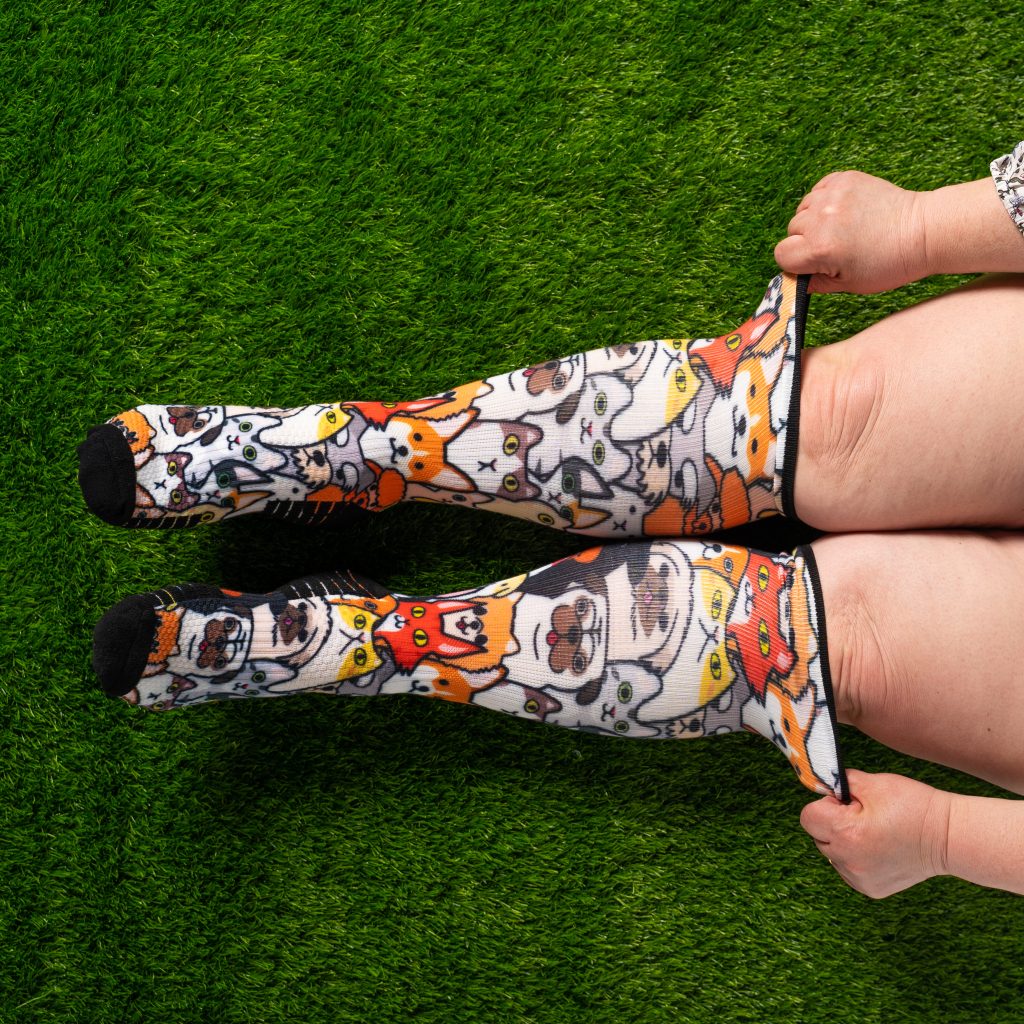Tackling neuropathy symptoms can be a daunting task. Among many treatment options, wearing therapeutic compression socks stands out as one of the simplest and most effective methods to ease the discomfort associated with peripheral neuropathy. These socks boast many healing properties, such as pain alleviation, blood circulation enhancement, and gentle relief. If nerve damage in the lower legs and feet is an issue, compression socks may prove to be a great tool.
Contents
- 1 Can Compression Socks Mitigate Diabetic Foot Pain?
- 2 Understanding the Connection Between Peripheral Neuropathy and Diabetes
- 3 Diabetic Socks vs. Compression Socks
- 4 Neuropathy: Symptoms and Causes
- 5 Signs of Foot Neuropathy
- 6 Potential Causes
- 7 Identifying the Source of Your Foot Pain
- 8 Foot Numbness and Tingling: Why Are My Feet Numb?
Can Compression Socks Mitigate Diabetic Foot Pain?
Compression socks are ingeniously designed to address diabetic foot pain. Elevated blood sugar levels can harm nerves throughout the body, with the legs and feet especially vulnerable. Finding the proper treatment to tackle the discomfort, pain, and numbness can be onerous. By wearing graduated compression socks, the foot and ankle are enveloped in a haven of soothing compression, alleviating pressure on the affected nerves and promoting blood circulation. For individuals experiencing pain in the calves and legs due to diabetes, knee-high compression socks offer sustained relief throughout the day.
Understanding the Connection Between Peripheral Neuropathy and Diabetes
Peripheral neuropathy originates from nerve damage, often caused by high blood sugar levels. Diabetes is one of the major causes of peripheral neuropathy, leading to a range of discomforts in the feet and ankles. This can impede daily activities and quality of life. In some cases, neuropathy pain can cause numbness and a tingling sensation, making mobility a challenge. Compression socks are highly beneficial for peripheral neuropathy; they wrap your feet in supportive compression and offer protection.
Diabetic Socks vs. Compression Socks
Understanding the difference when choosing between diabetic socks and compression socks, the decision is contingent on the specific benefits you are seeking. Diabetic socks primarily aim to prevent skin irritation, protect the feet and promote circulation without constricting the leg or foot. In contrast, compression socks are designed to reduce swelling, enhance circulation, and stimulate blood flow by applying gentle pressure to the legs and feet.
Neuropathy: Symptoms and Causes
Peripheral neuropathy, or neuropathy in the feet, arises from damage to the peripheral nerves, namely, the nerves outside the brain and spinal cord. If you are experiencing foot neuropathy, the symptoms and potential causes are as follows:
Signs of Foot Neuropathy
- Muscle weakness
- Numbness
- Sore or burning pain
- Reduced circulation
Potential Causes
- Diabetes
- Physical trauma
- Infections
- Metabolic disorders
- Genetic predispositions
- Exposure to toxins
Get rapid relief from debilitating foot pain through breathable, cozy, graduated compression socks. They can be easily slipped on and worn alongside shoes for daily activities or relaxation at home.
Identifying the Source of Your Foot Pain
Foot pain can stem from various conditions. Pinpointing the exact condition depends on the pain’s location, nature, and timing.
Heel pain: If the pain is localized in the heel, it may be due to plantar fasciitis. Compression socks can help alleviate stress during daily activities.
Arch pain: Pain in the arch could result from fallen or weakened arches. Compression socks relieve pressure on tired muscles.
Toe pain: Pain in the big toe is often caused by bunions or gouty arthritis. These conditions might develop from long-standing, walking, or wearing inappropriate footwear.
Pain throughout the foot: If pain is dispersed throughout the foot, it may indicate nerve damage and neuropathy. Compression socks designed specifically for neuropathy can provide comprehensive support, relief, and comfort.
Foot Numbness and Tingling: Why Are My Feet Numb?
Experiencing numbness, tingling, or a pins-and-needles sensation in the feet can be perplexing. These symptoms are generally caused by insufficient blood flow, nerve damage, or injury. Chronic foot numbness is often a sign of peripheral neuropathy. Graduated compression socks, especially those tailored to target the key areas of your feet, can prove enormously beneficial in combating foot numbness. Neuropathy socks offer optimal compression and support, significantly improving blood flow, especially during physical activity.
Neuropathy socks can be integral in managing and alleviating the symptoms associated with peripheral neuropathy and diabetic foot pain. These socks not only offer comfort but also facilitate blood circulation and render support to areas in need. Incorporating suitable compression socks into your daily routine can enhance your comfort and quality of life if you are experiencing swelling, foot pain, numbness, or tingling.

